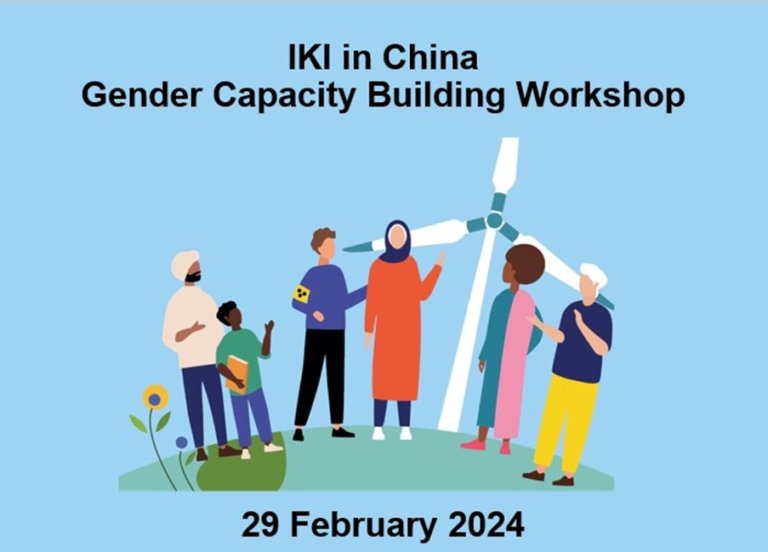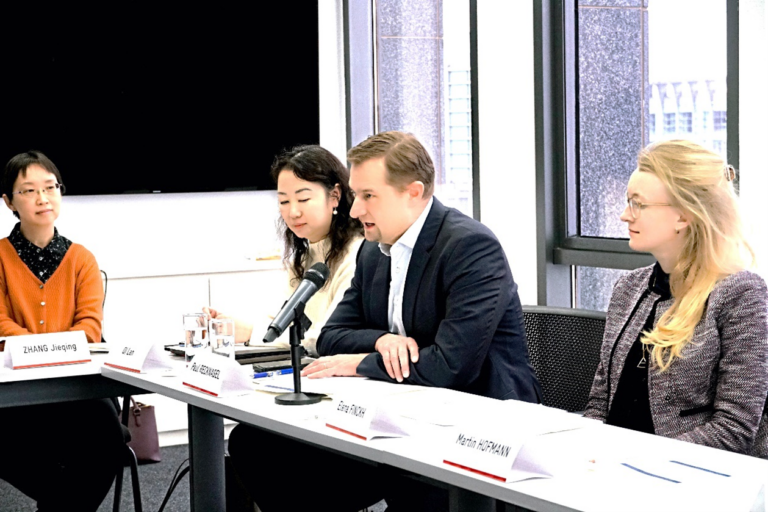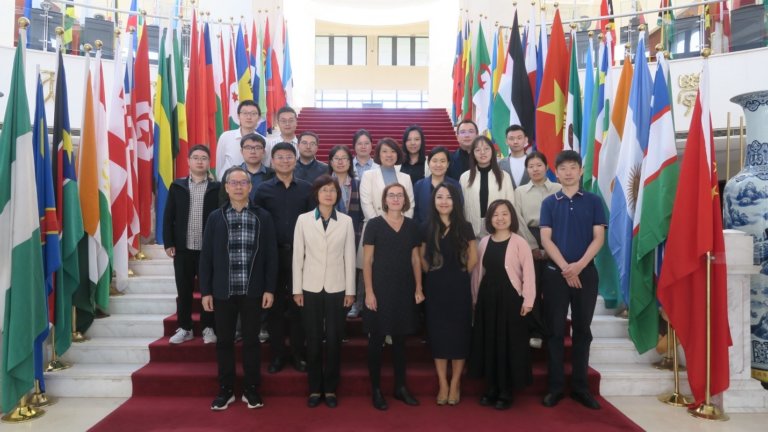On 23 March 2023, the GIZ and National Center for Climate Change Strategy and International Cooperation (NCSC) jointly organized a workshop on the topic ‘Mitigation in Provinces/Cities’ in Jinan, Shandong Province. The workshop was moderated by Mr Gao Xiang, Director of the International Policy Research Department of NCSC, with opening remarks by Ms Liu Yang from the Ministry of Ecology and Environment (MEE), Mr Ge Weiyan from the Shandong Department of Ecology and Environment, Ms Shao Xiaobo from Shandong Academy of Science, and Mr Ma Aimin from NCSC.

Ms Liu Yang, the Director of Division of Strategic Research and Coordination, MEE DCC, set the workshop in motion virtually. She provided context on why reducing CO2 in Shandong and Inner Mongolia, which are high-carbon-emitting provinces, is a difficult task, expounding on ways in which Germany’s decarbonisation experience can serve as a good model. This would help enhance knowledge sharing for relevant ‘Dual Carbon’ policies in China and Germany, in turn promoting optimisation and implementation of dual carbon policies, and possibly providing a reference point for other cities or provinces.
Mr Ge Weiyan, the Deputy Director General of Shandong DEE pointed out that Shandong Province has performed well regarding the mandate in low-carbon development from the central government, and at the same time carried out work such as climate financing pilots. The establishment of the new economy model pilot area provides direction and strategic opportunities for the economic transition in Shandong. The Sino-German Climate Change Cooperation- NDCI project chose Shandong to carry out this transition away from older economic models, this is significant not only for Shandong but for the whole country.
Ms Shao Xiaobo, the Deputy Director of the International Cooperation Division of the Shandong Academy of Science, suggested that China and Germany can further expand cooperation and deepen the project. At the same time, she looked forward to long-term cooperation to make more contributions to this field.

Mr Ma Aimin, the Deputy Director General of NCSC, emphasized that in order to achieve the goals of the Paris Agreement, more action and effort are required. China has updated its NDC, signifying increased ambition and enriching measures and actions it has taken. Mr Ma further elaborated on the need for local governments and their significant role in the actions of sectors and industries, especially projects with high-carbon emissions. He also elaborated on the fact that due to the lack of experience, research on typical regions is conducted to propose methods that can be used for reference.
At the presentation session, Mr Kristian Wilkening, Project Director from GIZ China, introduced the background and progress of the Sino-German Cooperation on Climate Change – NDC Implementation (SGCCC-NDCI) and Mitigation work package to the participants. He also briefly discussed the next steps of the Mitigation work package with local partners.
Dr Hu Jingtao of the Low Carbon Development Center of Inner Mongolia presented the Low-carbon development pathway study and policy recommendations for typical regions and industries. The presentation addressed important aspects of the overall concept of the low-carbon development pathway, such as policy background, situation analysis, model selection, policy suggestions, and the next work plan. With the Low Emissions Analysis Platform (LEAP) model, the cost per kilowatt for different generation methods under three scenarios – baseline, intermediate and advanced – were analysed. The policy recommendation of building a new power system with new energy as the mainstay was proposed as well.
Ms Anna Nilsson, a NewClimate Institute expert, presented on low-carbon heating in Inner Mongolia. The study is based on a background review of national and local policies, and topical research results combined with local heating conditions and current projects in Inner Mongolia. Detailed modelling, high-quality data, and studies on co-benefits related to sustainable development as future research needs were highlighted.
Prof Yan Guihuan of the Shandong Ecology Institute presented the findings from the German Low Carbon Transition Experience and Shandong Transition from Old to New Economic Engines. This research analyses the carbon reduction effect and potential of the transition from old to new economic energy in Shandong Province after learning from the advanced experience of low-carbon transition in Germany, by analysing the effectiveness and typical practices of the transition to new economic energy in Shandong Province. Several other suggestions, such as the implementation path of transition to new from old economic engine in the area of traditional industry transformation and upgrading, fostering the development of new industries, and Low Carbon Transition in Shandong Province, were also put forward.
Dr Victor Maxwell of Climate Analytics presented the EU’s effort-sharing approach to emissions reduction. He expanded on the lessons learned from ESR for China, suggested effort-sharing models for Chinese provinces, and made recommendations for future study. In this presentation, the research provides lessons that could be learned for China, such as using GDP per capita as a basis for effort sharing, certain flexibilities under the ESR, base year, and policy cohesion in the implementation phase.
An in-depth discussion by the attendees took place and was centered around ESR, energy demands, models, and further support by Chinese partners after the presentation session. The workshop was closed after closing remarks by Mr Ma Aimin.
More than 35 participants from the Shandong Ecology and Environment Department, GIZ, NCSC, Shandong Ecology Institute, Inner Mongolia Low Carbon Development Center, ERI, CECEP, and CASISD attended the workshop offline, and the MEE DCC, NewClimate Institute and Climate Analytics participated virtually. This workshop offered an offline exchange for all local mitigation workstream partners to present and communicate the work of the past two years. There was a mutual exchange of knowledge due to the presentations and question-and-answer session. This exchange helps enhance relevant work of the Chinese partners whilst the German partners gain a better grasp of the latest developments in China. This is the first face-to-face communication among NDCI local partners after COVID restrictions. More offline activities including in-person interactions with international partners are intended to gradually follow the conclusion of this workshop.



